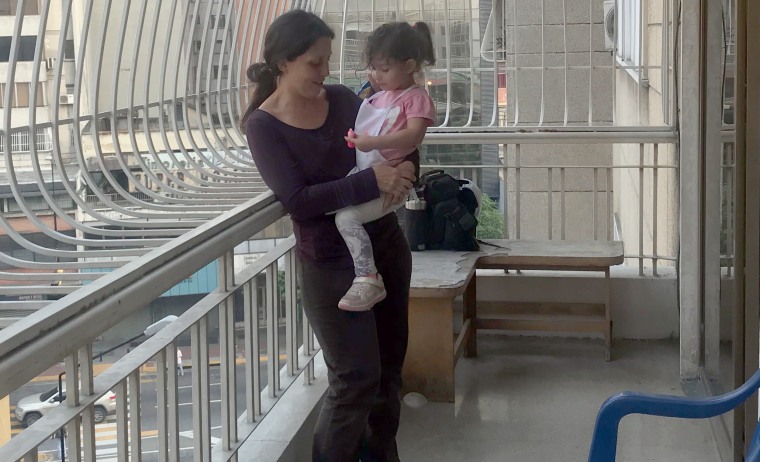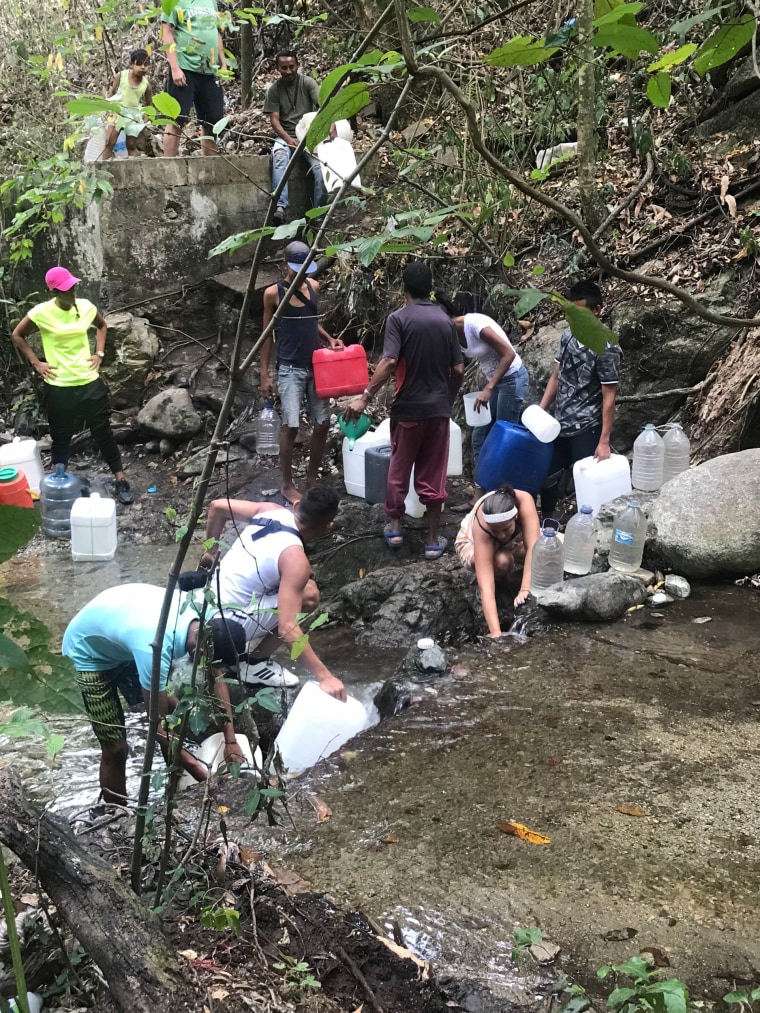CARACAS, Venezuela — Each morning, when Angela Carlucci wakes up, she must make difficult decisions.
Does she go to work at the children’s clothing store she owns in central Caracas, or does she keep her store closed to care for her daughter, whose preschool is shuttered?
Does she spend the day transporting water to her apartment, or does she burn several hours scouring the city for fresh meat and ice because their refrigerator doesn’t work without power?
"This is your life,” Carlucci, 42, said.
Venezuelans like Carlucci are struggling amid massive blackouts, as well as medical and food shortages as the power struggles continue between President Nicolás Maduro and Juan Guaidó, the opposition leader who declared himself interim president.
Amid the economic and political crisis, Carlucci's life took a turn several weeks ago. Her father who had cancer, and was low on medicine, died in the home they share during one of the country’s massive blackouts.
Now, Carlucci is debating whether to leave the country.
“Right now, I don't know if I have to go or if it's better if I wait a little bit more,” she said. “I really don't know what to do.”
Battling the blackouts
For the second time in a month, much of the country endured power outages that began around midday Monday and continue to affect all 23 states in the country.
Venezuela’s minister of communications, Jorge Rodriguez, said the outage was a “brutal” attack on the country’s hydroelectric plant. Maduro has called the outages acts of “sabotage” and has blamed the opposition and the United States.
Since Monday, lights in some neighborhoods have flickered on but many Venezuelans remain without cell service, water or lights in their homes — paralyzing the country.

Rodriguez announced on Twitter that all work and school activities would be suspended Thursday. On Friday, schools were set to close again.
“I deserve better,” Carlucci said. “I have worked really hard to have what I have. My daughter is years old — I had felt like I could provide a good life for her.”
Not anymore, she said.
Opposition keeps pressure but Maduro enjoys support
Guaidó rallied supporters Wednesday in central Caracas, urging them to oust Maduro.
“Today, Venezuelans woke up in the dark once again because of an inefficient, corrupt and thieving regime,” Guaidó said to a cheering crowd. “What we are fighting for every single day, is to live normally.”
The crowd included only about 200 people, a far cry from the thousands that had swamped his rallies two months ago, when he first declared himself the interim president and was recognized as the nation's leader by 50 countries.
Earlier this year, the Trump administration imposed sanctions on Venezuela’s state-owned oil company and threw its support behind Guaidó. Earlier this week at the White House, Guaidó’s wife, Fabiana Rosales, met with President Donald Trump and Vice President Mike Pence. They pledged their support to the opposition and criticized Russia’s recent deployment of military planes to the country.
Yet, Maduro enjoys support among many devotees of his predecessor, Hugo Chávez, who died in 2013 and spent extensively on social programs. Maduro's opponents argue that that spending — along with corruption and falling oil prices — obliterated the country’s economy.
His critics, however, claim Maduro is holding onto power through fear. Intelligence agents arrested one of Guaido’s top aides, Roberto Marrero, and on Thursday, Maduro’s government barred Guaidó from holding public office for at least 15 years, citing alleged irregularities in his financial records.
But in a Caracas public housing complex built several years ago with help from China, Maduro has strong support. Jenny Castro said she would have never owned her small apartment if it weren’t for the government. She called Guiadó a traitor — and wants to see him arrested.
“This is a sovereign country,” she said, adding this message for Trump: “Remove the economic sanctions.”
Desperate for water
Still, for many others, the desperation is mounting after years of a spiraling economic crisis.
That desperation brought Gabriela Jiménez to the side of a busy highway where firefighters were giving out water to the public Wednesday afternoon.
Firefighters here said they’ve always provided water to people living in the nearby mountains who don’t have access to water. But lately, more and more people from the city come to collect water — and the lines are getting longer.
“I’m going to use one of these bottles of water to bathe tonight,” Jimenez, who lives in Caracas, said. She said she’s had just six hours of electricity inside her home since Monday.
On the outskirts of the capital city, people stood in a long line Wednesday evening, waiting to collect water from a local river named Quebrada de Chacaíto.

Beside the line was the entrance to a public park where others followed a hiking path up a hill to other parts of the river with more privacy. There, many bathed themselves and washed their clothes along the banks of the river.
For Eloy Araujo, it was his first time doing that in the river. Araujo and his family said his house, in central Caracas, usually has water and electricity. This week, however, he said they were caught off guard with the latest power outage and didn’t have enough water stored.
On Wednesday, electricity returned to most of Caracas for roughly three hours but then went out again in multiple neighborhoods.
It's only a matter of time, Angela Carlucci said, before everything goes out again.
“The government is broken, but sometimes people are broken too,” she said.
FOLLOW NBC LATINO ON FACEBOOK, TWITTER AND INSTAGRAM.

